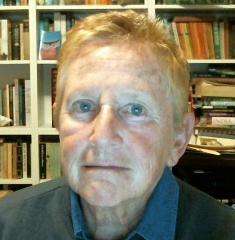Brett Dean’s Hamlet came to Adelaide after its successful debut at Glyndebourne last year, with some of the original singers, primarily Allan Clayton in the title role, but with some Australian subsitutions. It was outstanding on all fronts – sets, costumes, blocking, acting, singing, orchestral playing – but the question hovers as to whether it is really an opera, or just a play set to spectacular music.
This was a very cut-down version of Shakespeare’s original by librettist Matthew Jocelyn, with only about 20% of the original text being used. The essential, familiar elements and themes of the play were included. In the opening scene, a chorus sang about dust – Hamlet’s comment the “quintessence of dust” being a much-discussed phrase, relating to the immanence and prevalence of death, and the chorus returned to this at the end. The entire soliloquy was not (as might perhaps have been expected) cast as an aria, but parts of it were iterated and reiterated by Hamlet and others at different times: “not – or not to be – or not…” This version made no great effort to clarify whether Hamlet was actually demented, or pretending to be so, but certainly depicted him as eccentric, and not totally lacking in will.
The evening began with a low rumbling, reminiscent of Rheingold, and a dimly lit scene, which lit up to reveal people at white cloth-covered tables, within a stately white panelled room. Ralph Myers' setting was at various times smoothly transferred into a functional back-stage scene, or more open or confined settings as required. For the Yorick scene, Hamlet and Horatio descended from above on a platform, through which as it settled the gravedigger sprang up from below. Costumes (Alice Babidge) were understated modern dress, Hamlet in slightly unkempt black throughout, with Claudius, Gertrude and retinue in expensive-looking evening attire. Ophelia wore a rather dowdy frock until her mad scene, in which she appeared in a cut-away black coat over beige undergarment and dirty legs. Director Neil Armfield moved his singers around the stage in clever unobtrusive ways that brought the action to life. The appearance of the ghost was particularly well-managed – just a man standing on stage was suddenly transformed by light from an open door into an otherworldly figure.
As well as a heavy reliance on percussion, the orchestra featured unusual instruments such as a piano accordion, and a whole soundscape of other, unidentifiable sounds added to the atmosphere. The forces were huge: 70 orchestral players and a chorus of 40. That all this did not at any time overwhelm the solo singers was tribute to conductor Nicholas Carter, the Adelaide Symphony Orchestra and Brett Dean. If there is any shortcoming in the music, it does seem somewhat repetitive. While the sounds and colours are highly diverse from scene to scene, the overall mood, of the play and the opera, is one of relentless fate bearing down on all involved. What might have been lighter moments, such as Hamlet’s more intimate moments with Ophelia and the Yorick scene, did not escape this tremendous weight.
Allan Clayton carried all before him in his twitchy but compelling performance as Hamlet with a well-sustained tenor tone. Rod Gilfrey as Claudius and Kim Begley as Polonius brought their previous experience in the parts to bear, and Rupert Enticknap and Christopher Lowrey were the charmingly oleaginous Rosencrantz and Gildenstern in matching dove-grey suits. Gertrude was sung in the original by mezzo-soprano Dame Sarah Connolly, but in Adelaide we had soprano Cheryl Barker as the beleaguered queen, seemingly unmoved by her son’s accusations until near the end, emitting thrilling skeins of sound. The completely different-sounding soprano Lorina Gore, who originated the role of Honey B in Dean’s first opera Bliss, was touchingly vulnerable as Ophelia, also singing flawlessly. Jud Arthur, a memorable Fafner in the recent Opera Australia Ring, was as compelling as the ghost of Hamlet’s father and the very different role of the gravedigger. Completing the major roles was Samuel Sakker’s excellent Laertes; there was not a weak link in the cast with respect to either singing or acting.
It is hard to say whether Hamlet is a success as opera qua opera. I had a similar problem with Bliss, which for me only really became an opera in the second half. The unique quality of opera is that the singers convey their essential feelings through vocal music in a way that transcends the text and speaks directly to our hearts through musical language. There were not a lot of moments in Hamlet which demonstrated this, which is not to say it was not a great theatrical experience.




